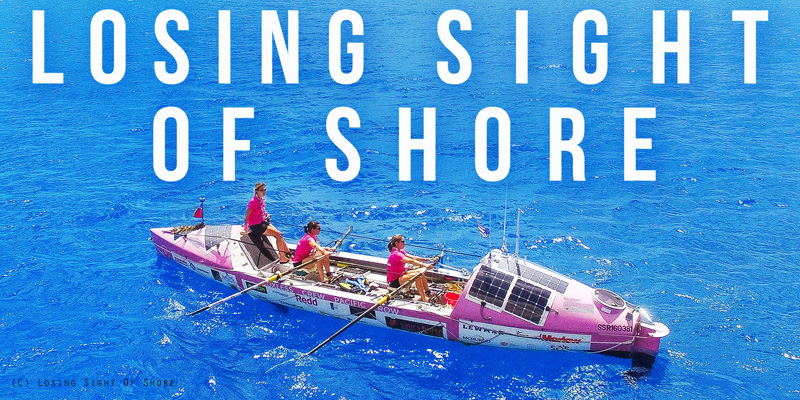Natalia Cohen is a team member of Coxless Crew, a team that became the first fours boat to row unsupported across the Pacific Ocean from America to Australia. Her ‘real world’ job is in the travel industry – with 15 years’ experience of living and working in over 60 countries and includes adventure tour leading, operations management, teaching / training, volunteer and project coordination as well as working within the Super Yacht industry and eco-lodge management, running a remote safari lodge in East Africa. She arrived in Australia in January 2016 alongside team mates Laura Penhaul, Emma Mitchell and Meg Dyos (who rowed the final leg, whilst Izzy Burham and Lizanne Van Vuuren rowed the first and second legs respectively).
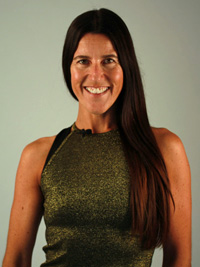
“…it’s interesting that Losing Sight of Shore is able to move the audience … in an intense 90-minute viewing – an amount of time that is not even as long as one of our two-hour rowing shifts!..”
Nat, we’ve spoken to you briefly before about your Pacific Row with Coxless Crew. For those who missed it, please can you give us a quick recap on your career to date and how you ended up joining the team?
I was involved in the travel industry in varying capacities for 15 years and have always been interested in the mind, the uniqueness of different people and team dynamics. I was intrigued by the chance to row across the Pacific because I was interested in challenging myself more than I had ever done before, I have always had a love of the ocean and knew that the journey would be a catalyst in helping me to better understand the human spirit.
I believe that this strength of human spirit is the most powerful force there is and we all have it within us; it was something that I always witnessed during my time in the travel industry when I was based in different destinations.
Being open to opportunities when they come my way and perfect timing, meant that when the expedition was presented I had just finished a contract managing a safari lodge in Tanzania, and the journey sounded like the perfect way to explore the mind and look deep within.
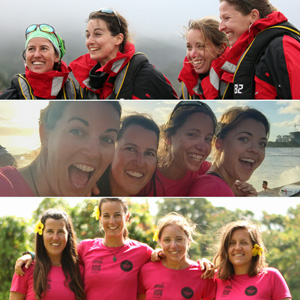
Having never rowed before, this was an example of being very far outside of my comfort zone and a steep learning curve in many ways. I have always been fascinated by teams and team dynamics and believe that growth and personal development is a hugely important part of life. Unimaginable opportunities to learn, support women fighting and overcoming adversity (through our charities – Breast Cancer Care and Walking With The Wounded) and hoping to inspire others to deal with their personal challenges all drew me to become involved with the Coxless Crew.
For me, life is all about extraordinary experiences, connections and making a difference. Rowing the Pacific seemed to embody all of those!
What was the experience of the row like?
If I had to choose one word, I would have to say … magical! Developing a mindset to allow me to celebrate small success and always look for the positive meant that I truly enjoyed the journey. There were so many highlights to share but some stand out moments involved:
- The powerful connection felt to my team, the mighty Pacific Ocean and to my inner world (what was going on in my mind).
- The opportunity to be fully present and in the moment.
- The wildlife encounters including breaching humpback whales, meters from the boat, sharks that followed us, turtles, dolphins, birds and fish were remarkable.
- The 360-degree horizon, view of ocean and sky, sunsets, sunrises and ever changing sea states were mesmerising but some of the most memorable moments have to be the raw emotion.
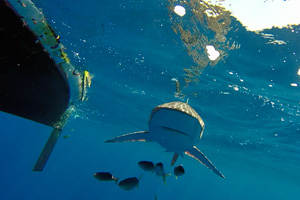
As a team, we supported each other amazingly and laughed and cried our way through all the discomfort, challenge, frustration and beauty. It was an experience like no other and I feel very fortunate to have had it.
What did it mean to you, not to become the first female crew of four to complete the challenge, but to become to first crew of four – male or female?
The fact that we became the first crew of four, male or female, to row across the full Pacific, was a wonderful thing to be able to share, however, that our team successfully and safely accomplished what we set out to do, over-rode everything else, to be honest.
That we could complete the challenge by also deepening our connection between one another and stepping off the boat as friends, as well as enjoying the journey and having incredible memories and shared moments, definitely means more to me.
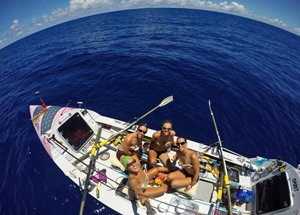
What the journey signified for me was that we were all part of a high performing team who pulled together, understood one another, supported each other and shared an underlying trust and respect that is a necessary foundation for any team to perform effectively. It was also a fascinating journey into our own minds as individuals and to learn all about our own personal mental resilience.
You and the rest of the crew took part in a documentary film about the row, Losing Sight of Shore, and you ran a screening in your hometown of Manchester on Saturday 20th May. Please can you tell us about this?
Having this incredible documentary created by Sarah [Moshman], has been such a bonus for all of us. We now have a beautiful overview of our expedition in a powerful 90-minute package, so watching it allows us all to be transported back onto the ocean momentarily.
Screening the film all over the UK has been amazing. It’s been surprising, humbling and very emotional. The event in Manchester was fantastic and being able to share the story of our journey with friends and family was unbelievably special.
HUGE thank you to @WomanthologyUK for introducing me to @coxlesscrew in Jan 2015, it’s safe to say my life has changed! #LSOSWorldTour pic.twitter.com/Pk0ExioHRy
— Sarah Moshman (@SarahMosh) May 20, 2017
The audience reaction to the highs and lows that you and the rest of the team experienced in the film was incredibly powerful. How does it make you feel to have such a strong impact on the people who watched?
What has blown me away more than anything is what an impact the documentary is having on people around the world. Both men and women are reaching out to us and sharing their feelings after watching the film, and both seem to have been moved in profound ways.
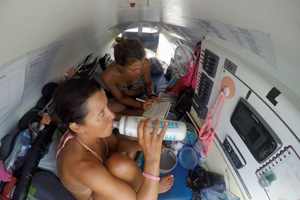
The film seems to evoke both laughter and tears and it’s almost as though our emotional roller coaster that we experienced out on the Pacific is mirrored by those that share a small portion of our journey with us. I suppose life is just that … a sea of ever-changing emotions and it’s interesting that Losing Sight of Shore is able to move the audience through most of them in an intense 90-minute viewing – an amount of time that is not even as long as one of our two-hour rowing shifts!
There’s lots of notions today of the importance of ‘strong’ women, but in the film, most of the team cried more than once. What do you think of the myth that ‘strong’ women shouldn’t be able to cry in a professional setting?
Crying, and showing any form of vulnerability, particularly within leadership, is very often perceived as a form of weakness. Why is this? Sometimes that vulnerability can actually help you form stronger connections within a team environment. It can unite team members and help develop empathy and compassion, which is so important in life and therefore also your business world.
Most of the tears that fall will be caused by frustration and quite often an opportunity to release that frustration and openly confront a work colleague or issue can be all that is needed to clear the air and increase or improve the work relationship or situation. Out on the ocean there were not so many different options for releasing our frustration, sadness, worry, disappointment etc., as we were in a confined space with nowhere to run or escape. Crying worked well as the most effective form of release.
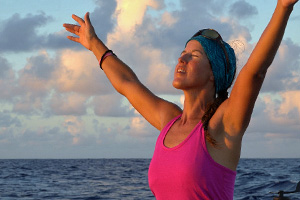
It took the least energy and space and the salty tears felt fitting for our oceanic environment! Most people seem to find it easier to cry alone or in a space that they feel is safe. It’s one of the most authentic ways of showing emotion, yet is frowned upon by society for some reason, and bottling that emotion and allowing it to dwell and grow into something stronger and less manageable is more accepted?!
For me, ‘strong’ women show mental resilience. It’s that ability to learn from past experiences and how you deal with challenges, as well as pick yourself up and carry on that is important. Brave leadership is all about allowing your team to shine. Whether you laugh or cry … an authentic display of emotion will generally connect us as humans. Work and indeed life is surely all about effective communication…
What are your tips for our readers to help them channel their emotions when they’re under pressure?
Most of the sensations we find arising in a work environment stem from the following emotions: frustration, anger, disappointment, worry, irritation, unhappiness. How to channel our emotions is a personal preference, so you need to find out what works the best for you.
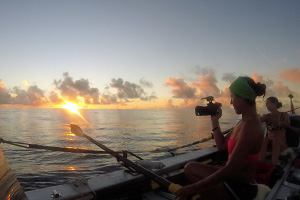
There are a number of techniques that we used out on the ocean that have been even more effective back on land. Developing coping strategies and ways to shift your mind set is always useful as is having an awareness of your thoughts and behaviours and how to challenge them. Below are some of the ways that I use to channel emotion or shift my focus to something different if necessary.
- Breathing. This will help bring your heart rate down and therefore make you feel calmer. Making yourself stop and take some deep breaths also helps you to refocus and clear your mind.
- Music, visualisation and mantras. Employ different coping strategies to distract yourself and move your mind away from that sensation that you want to cry or get angry and allow yourself an opportunity to step back and observe before reacting. I have always found music to be a very effective tool. It always transports me to a different place instantly.
- Get outside into nature. Even looking up at the sky can give you a different perspective and space from your emotions. Nature is a great reminder that everything changes and good way to relax and be fully present.
- Exercise is a great way to channel emotions and help release feelings. It’s a good way to be in the moment and to focus completely allowing all other thoughts to fall away. So, go for a walk, swim, the gym, bike ride. Whatever you can do to be active, make an effort to do it.
What is coming up next for you?
This undoubtedly has been a life-changing experience for me, however, I don’t know if I have changed as a person, rather that the direction of my life has changed. I definitely have a deeper and first hand understanding now of metal resilience, how high performing teams function and a new appreciation of time, space and the ocean.
Having returned from the expedition, I have found that I just want to share the learnt and reinforced insights and life lessons with as many people as possible – so I did not go back into the travel industry and I have been working instead as an inspirational speaker, workshop facilitator and mindset coach.
Excellent evening showing LOSING SIGHT OF SHORE sponsored by @FieriL_D in London! @coxlesscrew @SarahMosh @Jopickard pic.twitter.com/rolURRVNo7
— LosingSightofShore (@LSOSFilm) May 11, 2017
It’s been a wonderful journey so far and I would love anyone to reach out and connect if they feel that there is an opportunity to collaborate or work together.
http://www.nataliacohen.co.uk/
https://twitter.com/eyeofthenomad
To host screenings of Losing Sight of Shore, please contact Sarah Moshman at: http://www.losingsightofshore.com/

